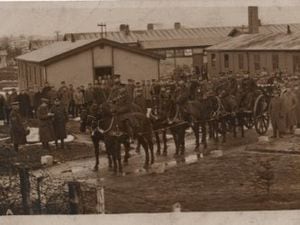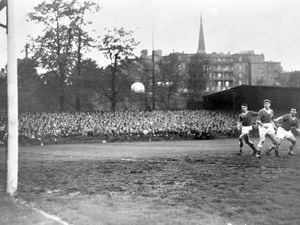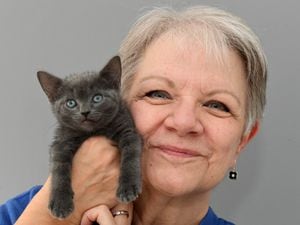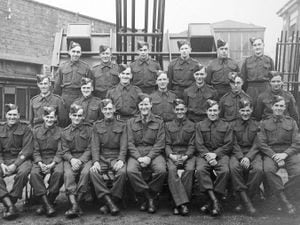'Haughty, ill-natured gent' whose way with words proved his doubters wrong
Mr Johnson had a unique way with words, long, unkempt blond locks, a chaotic personal life and was constantly strapped for cash.
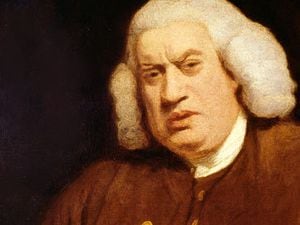
No, not that one. Although one suspects the Prime Minister would probably be a great admirer of his Staffordshire namesake, the legendary Lichfield lexicographer Samuel Johnson, even if he kept his flowing blond hair firmly beneath a wig.
Like Boris, Samuel Johnson was never short of a few words – he recorded definitions of 40,000 of them in his famous dictionary – and was known for his caustic wit.
Contrasting the 'city of philosophers' of his birth, with the brash metropolis up the road, he once remarked: “We work with our heads, and make the boobies of Birmingham work for us with their hands.”
But while the Prime Minister was destined for great things from the moment he secured a scholarship to Eton, Samuel's education was a much patchier affair, and his upbringing one of hardship and penury.
Johnson was born in Market Square on September 18, 1709, the son of a bookseller. His mother Sarah was 40 by the time of this birth, which at that time considered a late age to be giving birth, and there were concerns about his health from the moment he was born.
His aunt exclaimed that “she would not have picked such a poor creature up in the street,” and the family feared he would not survive. Shortly after he was diagnosed with tuberculosis. Known at the time as the ‘King’s Evil’ because it was thought royalty could cure it, his family arranged for Queen Anne to touch him on March 30, 1712, but the ritual proved ineffective, and an operation was performed that left him with permanent scars across his face and body.
From the age of three, his mother taught him to memorise and recite passages from the Book of Common Prayer, and when he was seven he started at Lichfield Grammar School. While he excelled in Latin, he started to exhibit the tics that would be a problem for him for the rest of his life. It was only after his death that he was diagnosed with Tourette's syndrome.
Samuel’s father Michael struggled financially to bring up his family, and at 16, Johnson went to live with his cousins in Stourbridge. One, Cornelius Ford, was a leading academic and notorious alcoholic who taught his young cousin the classics. But when Samuel returned to Lichfield, his headmaster was furious about his absence, and refused to allow him to return to school. To continue his education, Samuel went back to Stourbridge, and enrolled at King Edward VI Grammar School in Stourbridge, although he managed only six months before returning once more to his parents’ home in Lichfield.
As Johnson’s family continued to live in poverty, Samuel started stitching books for his father, where he is thought to have taken full advantage of being surrounded by books to expand his literary knowledge.
In 1728, his mother’s cousin Elizabeth Harriotts died, leaving enough money to send Samuel to university. With the help of friend and fellow student Andrew Corbet, he was able to enrol at Pembroke College, Oxford. But he continued to struggle financially, and returned to Lichfield after 13 months.
He tried to find work in teaching, but people found his tics disturbing. His application for the post of headmaster at Solihull School was turned down after the school’s directors described him as “a very haughty, ill-natured gent, and that he has such a way of distorting his face, which though he can’t help, the gents think it may affect some lads."
In 1734, his friend Harry Porter died, and Samuel began a relationship with his widow, Elizabeth, known as Tetty.
At 45 years old, Tetty was 21 years Samuel's senior, and the relationship did not meet with the unconditional support of her family.
Indeed, it so disgusted her son Jervis that he severed all relations with her, although her daughter Lucy was more accommodating. Her other son, Joseph, disapproved of the relationship in its early days, but later came to accept it.
It appears that Johnson himself was also somewhat apprehensive, but Tetty persuaded him to marry her in 1735 – promising to support him with her substantial savings.
The Rev William Shaw claims that "the first advances probably proceeded from her, as her attachment to Johnson was in opposition to the advice and desire of all her relations."
Johnson was inexperienced in such relationships, but the well-to-do widow encouraged him and may have been swayed by her promise to provide for him with her substantial savings. They married on July 9, 1735, at St Werburgh's Church in Derby.
She used some of her money to set Samuel up in business running a private school in Edial, near Lichfield. It proved a financial disaster, with just three pupils, costing Tetty a significant amount of her savings.
But while the school might not have not been a commercial success, but it did produce one distinguished alumni in 18-year-old David Garrick, who went on to become one of the most famous actors of his day.
Once more in poverty, Johnson and Garrick moved to London in on March 2, 1737, the day Johnson's brother died. He was penniless and pessimistic about their prospects, but Garrick had connections in London, and the two were able to stay with his distant relative, Richard Norris.
He struggled to eke out a living as a journalist, writing on a huge variety of subjects. He gradually acquired a literary reputation and in 1747 a syndicate of printers commissioned him to compile his ‘Dictionary of the English Language’. It took eight years, and Johnson employed six assistants, all of them working in his house off Fleet Street. The dictionary was published on 15 April 1755.
Contrary to popular myth, it was not the first such dictionary, but was certainly the most important at that time. In Johnson’s lifetime five further editions were published. A sixth came out when he died.
Tetty died in 1752 and shortly afterwards Francis Barber, a former slave from Jamaica, joined Johnson’s household as a servant. He lived with Johnson for more than 30 years, as did his wife and children, and became Johnson’s heir.
While his dictionary was a huge success, the income did not end his financial problems, and he was constantly short of money. These problems were alleviated a little in 1762, when he was awarded a government pension of £300 a year. In 1763, he met James Boswell, a young Scottish lawyer, whose ‘Life of Johnson’ (published in 1791) did much to spread Johnson’s fame. In 1773, Johnson and Boswell set out on a three-month tour of the Scottish Highlands and the Hebrides. Both wrote accounts of their travels. Johnson spent considerable time in Edinburgh in the 1770s.
Now a leader of the London literary world, Johnson was a friend of notable artists and writers such as Joshua Reynolds, Edmund Burke, Oliver Goldsmith and, of course, David Garrick. Another important friendship was with Henry Thrale, a wealthy brewer and member of parliament, and his wife Hester. Johnson became part of their family, treating their London houses as second homes.
Johnson died on 13 December 1784 and was buried at Westminster Abbey.
His childhood home, which had been built by Johnson's father in 1707, was bought for the city by benefactor in 1900, and opened as the Samuel Johnson Birthplace Museum in 1901. Statues of both Johnson and Boswell were also erected at either end of the Market Place.
While Johnson famously wrote under the pen-name 'Dr Johnson', he didn't earn a doctorate at university. Indeed, he never completed his degree, having dropped out of his studies at Oxford. But while his lack of formal qualifications, combined with his Tourette’s, put paid to his academic career, there can be little doubt that he made a huge contribution to shaping the English language.
And by 1755, it seems even the dons of Oxford realised his achievements merited official recognition.
In May that year, the university awarded him an honorary MA, just in time for it to be acknowledged in his first dictionary. He received doctorates from Trinity College, Dublin, in 1765, and from Oxford in 1775.
Years after being forced to leave Oxford in poverty and humiliation, Johnson’s genius had finally been recognised.
Samuel Johnson facts: *September 18, 1709: Born Market Square, Lichfield, son of Michael and Sarah Johnson.
*c1725-26: Moves to Stourbridge to live with his cousins.
*1728: Enrols at Pembroke College, Oxford. Unable to pay the fees, he leaves the following year.
*1735: Marries Tetty Porter. Sets up private school at Edial, near Lichfield, which closes in January 21, having attracted only three pupils.
*1737: He moves to London with former pupil David Garrick.
*1746: Begins work on his first dictionary.
*1749: Johnson's tragedy play Irene is performed at Garrik's Drury Lane Theatre.
*1755: After nine years' labour, Johnson's Dictionary of the English Language is finally published.
*1773: Johnson joins young Scottish lawyer James Boswell on a three-month tour of the Scottish Highlands and Hebrides. Both record their experiences in separate journals.
*1775: Receives a honorary doctorate from Trinity College, Oxford.
*December 13, 1784, dies aged 75. Is buried in Westminster Abbey the following week.

